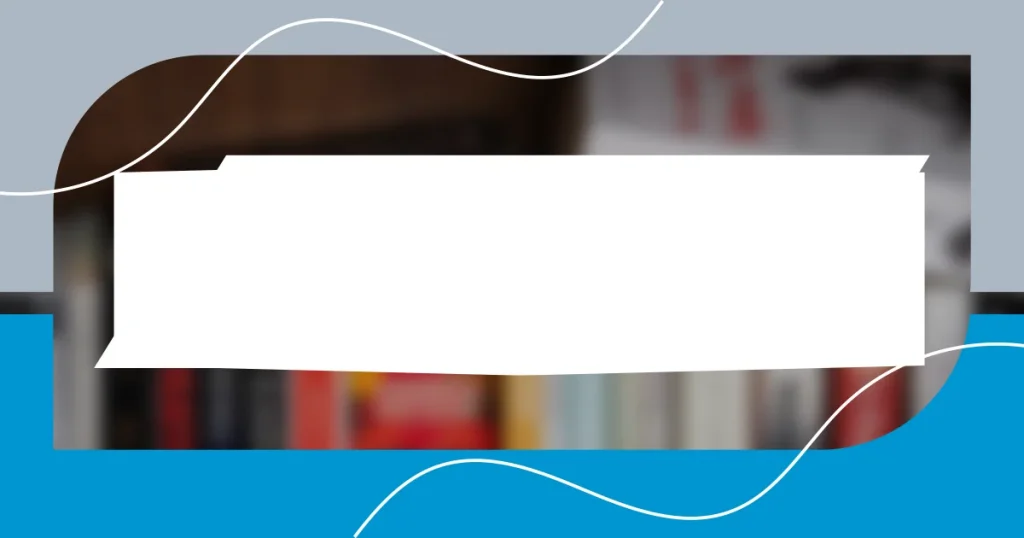Key takeaways:
- Self-help books like “The Gifts of Imperfection” and “Man’s Search for Meaning” emphasize embracing vulnerability and finding purpose in adversity.
- Fiction provides comfort and connection during tough times, allowing readers to reflect on their emotions and feel less isolated through relatable characters and narratives.
- Creating a personalized reading list based on current emotions or past inspirations can significantly enhance the supportive role of literature in navigating challenges.

Top books for tough times
One book that truly resonated with me during a particularly challenging phase was “The Gifts of Imperfection” by Brené Brown. I remember feeling lost in the pressure to be perfect, but Brown’s insights on vulnerability and self-compassion encouraged me to embrace my flaws. Have you ever found yourself holding back because of fear? This book drives home the idea that embracing our imperfections can lead to a more fulfilling life.
Another remarkable read is “When Things Fall Apart” by Pema Chödrön. Her teachings about the inevitability of chaos and discomfort became a comforting guide during tough moments. I often found solace in her words, pondering how accepting pain can lead to personal growth. Have you ever noticed how hard it is to accept difficult emotions? This book helped me see those feelings as a pathway to deeper understanding instead of something to avoid.
Lastly, “Man’s Search for Meaning” by Viktor E. Frankl holds a special place in my heart. Frankl’s incredible perspective on finding purpose, even in the most harrowing circumstances, helped me shift my focus from despair to hope. I often think back to how he redefined suffering through meaning and realized that even in pain, there is an opportunity for growth. What do you think about finding meaning in hardships—does it resonate with you?

Personal stories of survival
Reading books during tough times often feels like having a wise friend by your side. One powerful story that struck me was about a woman who lost her job unexpectedly. Holding onto the words of “Wild” by Cheryl Strayed, she decided to embark on a hiking journey that became a metaphor for her healing. As she traversed the rugged terrain, she discovered not just the beauty of nature but also a renewed sense of self. I couldn’t help but reflect on how sometimes, the challenges we face push us toward unexpected paths of growth.
- A friend shared how “Tiny Beautiful Things” by Cheryl Strayed served as a lifeline during her battle with depression.
- Another was drawn to “Educated” by Tara Westover, finding strength in overcoming familial struggles.
- Someone else mentioned “The Alchemist” by Paulo Coelho, which inspired them to pursue their dreams despite setbacks.
- Even “The Power of Now” by Eckhart Tolle provided a framework for a colleague to cope with anxiety, emphasizing mindfulness in challenging times.
Each of these stories reminds me how deeply literature can touch our hearts and inspire resilience. When I hear these accounts, I can’t help but feel a shared connection—like we’re all navigating our own storms, sometimes finding calm in the pages of a book.

Key themes in self-help books
Self-help books often explore the themes of resilience, self-acceptance, and personal growth. I remember diving into “Option B” by Sheryl Sandberg and Adam Grant when I felt particularly overwhelmed with loss. Their message about perseverance after adversity really resonated with me. The idea that we can find light in dark times inspired me to keep pushing forward, reminding me that it’s okay to seek joy again after experiencing pain.
One prevalent theme in self-help literature is the importance of mindset. Carol Dweck’s “Mindset: The New Psychology of Success” shifted my perspective on challenges. By adopting a “growth mindset,” I learned to view setbacks as opportunities for learning rather than failures. I often ask myself, “How can I grow from this?” This book helped me see that a positive outlook can transform how we approach obstacles in our lives.
Another key theme I find compelling is the power of connection—both with ourselves and others. In “Braving the Wilderness,” Brené Brown explores the complexities of belonging. Her insights on being true to oneself while developing meaningful connections were enlightening for me. There were times when I felt isolated, but her work encouraged me to reach out and build a supportive community around me. Isn’t it fascinating how a simple connection can uplift us in our darkest moments?
| Theme | Description |
|---|---|
| Resilience | Finding strength and hope after experiencing loss or hardship. |
| Mindset | Shifting perspective to view challenges as opportunities for growth. |
| Connection | Building authentic relationships to foster support and belonging. |

How fiction can provide comfort
Fiction has an incredible ability to transport us to different worlds, often providing a comforting escape during tough times. I remember when I was feeling particularly lost; diving into “The Night Circus” by Erin Morgenstern was like stepping into a dream. The book’s whimsical atmosphere wrapped around me, almost like a warm blanket, making me forget my worries for a little while. Doesn’t it feel amazing how a story can make our reality fade, even if just for a moment?
Characters in fiction often mirror our own struggles, allowing us to reflect on our emotions. For instance, when I encountered Elizabeth Gilbert’s “Eat, Pray, Love,” I was struck by her quest for self-discovery after experiencing significant upheaval. It felt as though I was navigating my own journey alongside her, and I often found myself asking, “What would I do in her shoes?” That connection not only made my own challenges feel less isolating but also ignited a spark of hope in me.
Moreover, stories of perseverance can serve as powerful motivators. When I read “The Kite Runner,” the themes of redemption and friendship resonated deeply with me, especially during a time when I felt burdened with guilt over my own past decisions. The narrative taught me that it’s never too late to seek forgiveness or make amends. Isn’t it inspiring to think that our fictional heroes can guide us toward bravery in our real lives?

Building resilience through reading
Reading has played a crucial role in helping me build resilience when life gets tough. I remember picking up “The Gifts of Imperfection” by Brené Brown during a particularly challenging phase. Her exploration of embracing vulnerability felt like a warm embrace, guiding me to confront my fears instead of hiding from them. Isn’t it liberating to think that acknowledging our imperfections can actually lead to personal strength?
In my experience, the narratives in self-help books often equip us with practical tools to navigate adversity. For example, I found solace in “Rising Strong,” where Brown discusses the importance of getting back up after falling. The real-life stories she shares resonate deeply, reminding me that setbacks are part of the journey—not the end of it. This perspective shift encouraged me to approach my own challenges head-on. Have you ever thought about how a setback could actually become a springboard for growth?
When I delve into these texts, I often feel a sense of companionship with the authors. It’s almost as if they are whispering words of encouragement directly to me. In “Daring Greatly,” I was struck by the idea that courage isn’t about being fearless, but rather about facing our fears. This revelation offered me a comforting reminder: it’s okay to be afraid—it’s how we respond that truly matters. Have you found that certain books have given you the courage to face your own fears?

Tips for selecting helpful books
Selecting the right books during challenging times is essential for finding solace and support. One of my go-to strategies is to explore genres that resonate with my current emotional state. For instance, when I’m feeling overwhelmed, I gravitate towards light-hearted fiction or humor. Have you ever noticed how a chuckle can lighten the heaviest of burdens? The right laugh can remind us that life has its whimsical sides, even amid adversity.
Another helpful tip is to look for books with relatable characters or themes. I recall picking up “Wild” by Cheryl Strayed when I was grappling with personal loss. Her honest journey of self-discovery through hiking resonated deeply with my own struggles. It’s fascinating how reading about someone else’s fight can fuel your determination. Do you ever find inspiration in the bravery of characters as you navigate your challenges?
I also recommend reading reviews or listening to recommendations from trusted friends. Sometimes, a personal connection can make all the difference. I appreciated the insights of a friend who suggested “Big Magic” by Elizabeth Gilbert during a creative drought in my life. The book not only reignited my passion but also gave me a sense of community with those who face similar creative hurdles. Isn’t it reassuring to realize we aren’t alone in our paths?

Creating your personalized reading list
Creating your personalized reading list is a deeply personal journey that reflects what resonates with you. I often start by jotting down the emotions I’m grappling with at the moment—whether it’s sadness, anxiety, or a sense of loss. This process helps me pinpoint genres or topics that may offer comfort or insight. Have you ever taken a moment to reflect on your feelings before choosing a book? It can make a world of difference.
Another approach I find effective is to explore authors who have inspired me in the past. For instance, I remember feeling a connection with bell hooks after reading her essays on love and community. Each time I return to her work, I gain a fresh perspective that feels like checking in with an old friend. Do you have writers who feel like mentors to you in times of need? Their words can often provide the guidance we seek.
Lastly, I think it’s essential to create a list that evolves. As I grow and face new challenges, my reading choices shift. Last year, I found myself drawn to memoirs, as they offered genuine human experiences that reassured me I wasn’t alone. Have you ever revisited a book years later and found it speaks to you in an entirely new way? It’s this ongoing dialogue with literature that makes building a personalized reading list an enlightening experience.
















